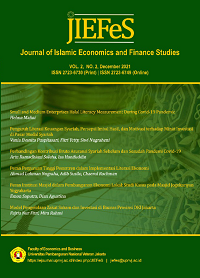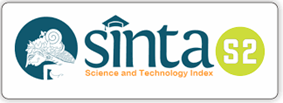Small and Medium Enterprises Halal Literacy Measurement During Covid-19 Pandemic
DOI:
https://doi.org/10.47700/jiefes.v2i2.3345Keywords:
Awareness, Economic Resilience, Halal Literacy, Small and Medium EnterprisesAbstract
Abstract
The purpose of this study is to determine the level of halal literacy among Small and Medium Enterprises (SMEs) in Indonesia. The aspects studied are knowledge about halal behavior, halal attitude and halal knowledge. This research is a descriptive study based on a survey of research subjects using a purposive sampling technique. The population in this study were SMEs in Indonesia with a focus on the cities of Jakarta, Bandung, Surabaya and Pontianak with a total sample of 150 people. The sample was composed of owners of SMEs in Indonesia between the ages of 19 and 45. The age group used as a sampling criterion is determined by the differences that may exist between age groups or generations. The results of the study indicate that the overall level of education in Indonesia, SMEs halal literacy is defined as sufficient literacy. It is hoped that the proposed measures of halal literacy in SMEs will assist policymakers in better understanding the level of literacy among SMEs to create a better halal ecosystem to improve economic resilience’s toward crisis.
Abstrak
Tujuan dari penelitian ini adalah untuk mengetahui tingkat literasi halal pada Usaha Kecil Menengah (UKM) di Indonesia. Aspek yang dipelajari adalah pengetahuan tentang perilaku halal, sikap halal dan pengetahuan halal. Penelitian ini merupakan penelitian deskriptif berdasarkan survei terhadap subjek penelitian dengan menggunakan teknik purposive sampling. Populasi dalam penelitian ini adalah UKM di Indonesia dengan fokus kota Jakarta, Bandung, Surabaya dan Pontianak dengan jumlah sampel 150 orang. Sampel terdiri dari pemilik UKM di Indonesia antara usia 19 dan 45 tahun. Kelompok usia yang digunakan sebagai kriteria pengambilan sampel ditentukan oleh perbedaan yang mungkin ada antara kelompok usia atau generasi. Hasil penelitian menunjukkan bahwa secara keseluruhan tingkat pendidikan di Indonesia, literasi halal UKM didefinisikan sebagai literasi yang cukup. Diharapkan langkah-langkah literasi halal yang diusulkan di UKM akan membantu pembuat kebijakan dalam lebih memahami tingkat literasi di kalangan UKM untuk menciptakan ekosistem halal yang lebih baik untuk meningkatkan ketahanan ekonomi terhadap krisis.
References
Adinugraha, H. H., Oktafiyani, M. and Mubtadi, N. A. (no date) HALAL LIFESTYLE: Theory and Practice in Indonesia. Zahir Publishing.
Amri, A. (2020) ‘Dampak Covid-19 Terhadap UMKM di Indonesia’, Jurnal Brand.
Aziz, N. I. A. and Ahmad, F. A. (2018) ‘The Halal Lifestyle of Muslim Working Women’, International Journal of Academic Research in Business and Social Sciences, 8(5), pp. 1138–1147.
Danes, S. M., Huddleston-Casas, C. and Boyce, L. (1999) ‘Financial planning curriculum for teens: Impact evaluation’, Journal of Financial Counseling and Planning, 10(1), p. 26.
Elasrag, H. (2016) Halal industry: Key challenges and opportunities. Hussein Elasrag.
Fernandes, D., Lynch Jr, J. G. and Netemeyer, R. G. (2014) ‘Financial literacy, financial education, and downstream financial behaviors’, Management Science, 60(8), pp. 1861–1883.
Hakim, A. L. (2015) ‘Dissecting the Contents of Law in Indonesia on Halal Product Assurance’, Indon. L. Rev., 5, p. 88.
Haque, M. G. and Hindrati, D. (2020) ‘Investigating Awareness & Knowledge, Halal Logo and Religiosity Affecting Decision and Lifestyle to Consume Halal Culinary; Case Study of Three Indonesian Regions in Japanese Restaurant’, Jurnal Ilmu Manajemen & Ekonomika, 12(1), pp. 27–31.
Hosen, M. N. and Lathifah, F. (2020) ‘Comparison of Halal Certification in Several Countries toward Halal Standard of Indonesia’.
Huston, S. J. (2010) ‘Measuring financial literacy’, Journal of consumer affairs, 44(2), pp. 296–316.
Joseph, O. P., Tulung, J. E. and Wangke, S. (2020) ‘Impact of social media marketing towards business performance of MSMES in Manado during COVID-19 pandemic’, Jurnal EMBA: Jurnal Riset Ekonomi, Manajemen, Bisnis dan Akuntansi, 8(4).
Kramer, M. M. (2016) ‘Financial literacy, confidence and financial advice seeking’, Journal of Economic Behavior & Organization, 131, pp. 198–217.
Lusardi, A. and Mitchell, O. S. (2011) ‘Financial literacy around the world: an overview’, Journal of pension economics & finance, 10(4), pp. 497–508.
Mandell, L. and Klein, L. S. (2007) ‘Motivation and financial literacy.’, Financial services review, 16(2).
Mandell, L. and Klein, L. S. (2009) ‘The impact of financial literacy education on subsequent financial behavior’, Journal of Financial Counseling and Planning, 20(1).
Misbach, I. (2017) ‘Perilaku Bisnis Syariah’, Al-Idarah, 5, pp. 33–44.
Nugroho, I. S., Bhagya, T. G. and Rosinawati, D. (2020) ‘Industri dan Supply Chain Halal dilihat dari Aspek Keilmuan Teknik Industri’, Sainteks: Jurnal Sains dan Teknik, 2(2), pp. 58–71.
Pakpahan, A. K. (2020) ‘COVID-19 dan Implikasi Bagi UMKM’, Covid-19 Dan Implikasi Bagi Usaha Mikto, Kecil, Dan Menengan.
Pinto, M., Pulgarín, A. and Escalona, M. I. (2014) ‘Viewing information literacy concepts: a comparison of two branches of knowledge’, Scientometrics, 98(3), pp. 2311–2329.
Pitaloka, H. et al. (2020) ‘The economic impact of the COVID-19 outbreak: Evidence from Indonesia’, Jurnal Inovasi Ekonomi, 5(02).
Putri, A. K. and Sunesti, Y. (2021) ‘Sharia Branding in Housing Context: A Study of Halal Lifestyle Representation’, JSW (Jurnal Sosiologi Walisongo), 5(1), pp. 77–92.
Samori, Salleh, D. (2015) ‘Current Trends In Halal Tourism: Cases on Selected Asian Countries’, in, p. hlm. 132.
Sobari, N., Kurniati, A. and Usman, H. (2019) ‘The influence of Islamic attributes and religious commitments toward halal wellness services customer satisfaction and loyalty’, Journal of Islamic Marketing.
Sukardani, P. S., Setianingrum, V. M. and Wibisono, A. B. (2018) ‘Halal lifestyle: current trends in Indonesian Market’, in 1st International Conference on Social Sciences (ICSS 2018). Atlantis Press, pp. 334–339.
Suyatman, U., Ruminda and Yatmikasari, I. (2018) ‘Pulau Lombok : Pengembangan Wisata Halal dalam Bingkai Kearifan Lokal’, pp. 1–99.
Timur, U. P. N. V. J. (2018) ‘Halal Lifestyle: Current Trends In Indonesian Market’.
Wilson, J. A. J. (2014) ‘The halal phenomenon: an extension or a new paradigm?’, Social Business, 4(3), pp. 255–271.
Zaroni, A. N. (2012) ‘Landasan Filosofis Perilaku Konsumen Dalam Perspektif Ekonomi Islam Dan Konvensional’, Mazahib, 10(1).
Downloads
Published
Issue
Section
License
Authors who publish with this journal agree to the following terms:
- Authors retain copyright and grant the journal right of first publication with the work simultaneously licensed under a Creative Commons Attribution 4.0 International License that allows others to share the work with an acknowledgment of the work's authorship and initial publication in this journal.
- Authors can enter into separate, additional contractual arrangements for the non-exclusive distribution of the journal's published version of the work (e.g., post it to an institutional repository or publish it in a book), with an acknowledgment of its initial publication in this journal.
- Authors are permitted and encouraged to post their work online (e.g., in institutional repositories or on their website) before and during the submission process, as it can lead to productive exchanges, as well as earlier and greater citation of published work.

This work is licensed under a Creative Commons Attribution 4.0 International License.











